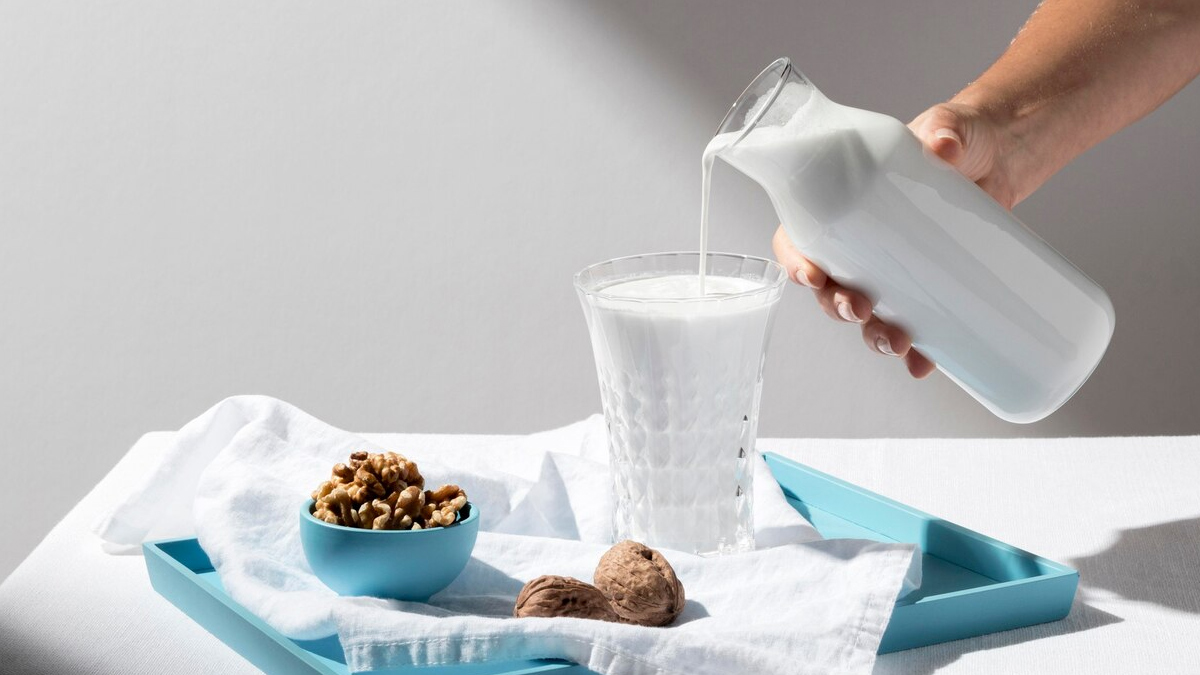
People with persistent digestive problems are often advised to keep dairy products at bay. Doctors recommend leading a dairy-free life, especially if people are lactose intolerant or have been diagnosed with Irritable Bowel Syndrome (IBS), a condition characterised by abdominal pain and changes in bowel habits, such as diarrhoea, constipation, or both.
Table of Content:-
But while completely cutting off dairy products like milk can be difficult, especially if you are a tea or coffee enthusiast, here’s a guide to exploring alternatives and weighing the pros and cons of whole versus low-fat milk. A gastroenterologist helps understand which one of the two is better for people with IBS and shares other healthy milk alternatives.
Also Read: Are IBS Symptoms Worse In The Morning? A Gastroenterologist Shares Tips To Reduce Flare-Ups
Common Triggers For IBS Patients

IBS is commonly triggered by lifestyle factors, including foods, stress, and certain medications. While triggers can vary from person to person, some common culprits are dairy, gluten, spicy foods, high-fat meals, and more.
A doctor often recommends following a low FODMAP diet, which is low in fermentable oligosaccharides, disaccharides, monosaccharides, and polyols (FODMAPs), as these can be difficult to digest and can cause gas, bloating, and pain.
How Dairy Impacts IBS Patients
In an interaction with the OnlyMyHealth team, Dr Anupama N K, Consultant - Medical Gastroenterology, Aster CMI Hospital, Bengaluru, says that many individuals with IBS report that dairy products increase their symptoms, such as bloating, gas, diarrhoea, and abdominal pain. "This reaction is often attributed to lactose intolerance, a common condition where the body lacks the enzyme lactase needed to properly digest lactose, the sugar found in milk and dairy products," he explains.
Several studies have explored the link between self-reported milk intolerance and IBS, but results remain inconclusive. A 2020 study published in the journal Cureus cited an Iranian survey that found that lactose intolerance was more commonly reported among women, IBS patients, and those using NSAIDs or acetaminophen. However, hydrogen breath test studies suggest a disconnect between reported symptoms and actual lactose malabsorption. These findings highlighted that self-reported milk intolerance does not reliably predict actual lactose malabsorption, and IBS symptoms may be caused by other factors in milk or individual variability in digestion.
For those with IBS, even small amounts of lactose can trigger discomfort, leading to a cycle of avoidance and dietary restrictions. Additionally, the impact of dairy on IBS can vary significantly from person to person, influenced by individual tolerance levels and the overall composition of their diet.
Whole Milk Or Low-Fat Milk: Which Is Good For People With IBS?

According to Dr Anupama, whole milk contains a higher fat content, which can slow down the digestive process and potentially exacerbate symptoms such as bloating, gas, and discomfort in those with IBS. “The fats in whole milk may also stimulate the gut, leading to increased contractions that can trigger IBS flare-ups,” she says.
In contrast, low-fat milk has a reduced fat content, making it easier for some individuals to digest. This reduction in fat can help minimise gastrointestinal distress, allowing for a more comfortable experience when consuming dairy products.
Therefore, for IBS sufferers, opting for low-fat milk may be a more suitable choice, as it is less likely to provoke symptoms and can provide a gentler alternative while still offering the nutritional benefits of dairy.
Also Read: When You Have Too Many Bowel Movements In A Day: Is It Alarming?
Plant-Based Milk Alternatives To Try

Many traditional dairy products can increase IBS symptoms due to their lactose content, which can lead to bloating, gas, and discomfort for those who are lactose intolerant. So, plant-based milks, such as almond, oat, and coconut milk, often contain lower levels of FODMAPs, which are fermentable carbohydrates that can trigger IBS symptoms.
Additionally, these alternatives are typically fortified with vitamins and minerals, providing nutritional benefits without the digestive distress associated with dairy. By choosing plant-based options, IBS patients may find relief from their symptoms while still enjoying a variety of flavours and textures, making these alternatives not only a practical choice but also a delicious one.
Conclusion
Milk is a great source of calcium and is good for your bones and muscles. However, for people with IBS, milk may cause digestive discomfort leading to pain, gas, and bloating. Between whole and low-fat milk, experts recommend opting for the latter, as it may be lighter on the stomach. However, choosing a plant-based alternative is recommended if you have IBS or lactose intolerance. Consult a doctor to know the best way forward in managing symptoms.
Also watch this video
How we keep this article up to date:
We work with experts and keep a close eye on the latest in health and wellness. Whenever there is a new research or helpful information, we update our articles with accurate and useful advice.
Current Version